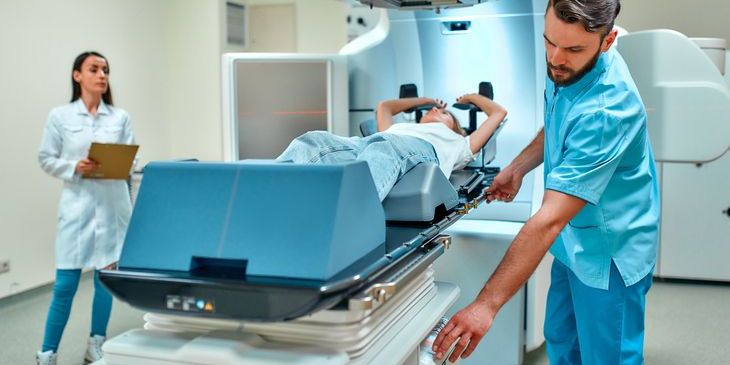What is a Dosimetrist?
A dosimetrist specializes in calculating and planning the exact radiation doses needed for cancer treatment. These professionals work closely with radiation oncologists and radiation therapists to create treatment plans that target cancerous tumors while minimizing harm to healthy tissue. Their role is essential in ensuring that radiation therapy is as effective and safe as possible.
Dosimetrists use advanced computer software to design detailed radiation treatment plans. They take into account factors like tumor size, location, and type, as well as the patient’s overall health. By carefully calculating the correct dosage, they help ensure that the radiation is delivered accurately to the cancer cells while protecting surrounding healthy areas.
What does a Dosimetrist do?

Duties and Responsibilities
The duties and responsibilities of a dosimetrist include several key tasks related to planning and delivering radiation treatment for cancer patients. Here are some of the main duties:
- Calculating Radiation Doses: Dosimetrists are responsible for determining the precise amount of radiation a patient needs to treat their cancer effectively. They use advanced software to create a detailed treatment plan that delivers the right dosage to the tumor while protecting healthy tissue.
- Creating Treatment Plans: After calculating the dose, dosimetrists design the layout for the treatment, determining how and where the radiation beams will be aimed. This plan is carefully reviewed and approved by a radiation oncologist to ensure it meets the patient's specific needs.
- Collaborating with Healthcare Teams: Dosimetrists work closely with radiation oncologists, therapists, and other healthcare professionals. They communicate treatment plans, make adjustments when needed, and monitor the patient’s progress to ensure the treatment is effective and safe.
- Ensuring Radiation Safety: A crucial part of their job is ensuring that all radiation safety protocols are followed. They make sure the treatment is delivered accurately and that both patients and staff are protected from unnecessary radiation exposure.
Types of Dosimetrists
There are several types of dosimetrists, each specializing in different areas within radiation therapy. Here are the main types:
- Clinical Dosimetrist: This is the most common type of dosimetrist. Clinical dosimetrists work directly with radiation oncologists to create treatment plans for cancer patients. They are involved in calculating radiation doses, designing treatment plans, and ensuring that the radiation is delivered accurately during therapy sessions.
- Treatment Planning Dosimetrist: Treatment planning dosimetrists focus primarily on developing and optimizing radiation treatment plans. They utilize advanced computer systems and software to design complex plans that ensure precise delivery of radiation while minimizing exposure to healthy tissues. Their work is critical in ensuring the effectiveness and safety of radiation therapy.
- Medical Dosimetrist: A medical dosimetrist may have a broader role that encompasses both clinical and administrative responsibilities. They might work in a healthcare setting but also be involved in quality assurance, radiation safety compliance, and training new dosimetrists or radiation therapy staff.
- Specialized Dosimetrist: Some dosimetrists choose to specialize in certain areas of treatment, such as brachytherapy (a type of internal radiation therapy) or stereotactic radiosurgery (a precise form of radiation therapy). These specialized dosimetrists develop treatment plans tailored to the specific needs of patients undergoing these advanced techniques.
Dosimetrists have distinct personalities. Think you might match up? Take the free career test to find out if dosimetrist is one of your top career matches. Take the free test now Learn more about the career test
What is the workplace of a Dosimetrist like?
The workplace of a dosimetrist is typically found in a healthcare setting, such as a hospital or a cancer treatment center. They usually work in radiation oncology departments, where they collaborate closely with radiation oncologists, radiation therapists, and medical physicists. The environment is generally high-tech and involves specialized equipment for radiation therapy planning and delivery.
Dosimetrists spend much of their time in a designated office or lab area, where they use advanced computer software to create treatment plans. This workspace is equipped with computers, 3D imaging tools, and software designed for calculating radiation doses and simulating treatment scenarios. They may also work in clinical areas where they interact with patients, explaining procedures and ensuring they understand the treatment process.
The work can be fast-paced, especially in busy treatment centers. Dosimetrists often juggle multiple cases at once, ensuring that each patient receives the best possible care. They typically work standard hours but may occasionally be on call or work extended hours to meet patient needs.
Dosimetrists are also known as:
Radiation Oncology Dosimetrist